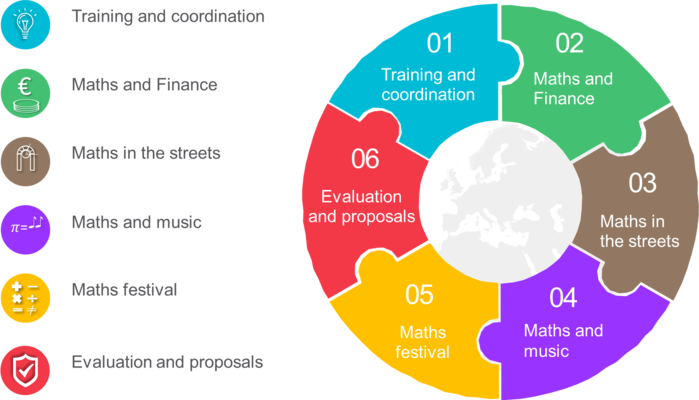
Threre will be six mobilities:
1st Mobility. Training workshops, team building and fine-tuning. In this mobility no students will take part. The main objectives will be: choose the logo, design a test that measures the mathematical anxiety, exchange of experiences of good practice, plan in detail the next mobilities and create a good atmosphere among the members of the Steering Committee team.
2nd Mobility. Maths and Finance. Students will become familiar with tools that are used to make decisions in economics and finance. They must learn about the stock exchange and what the Euro Stoxx 50 index is. They will manage a fictitious “investment fund” with a certain initial capital and each team will create a presentation with “profit and loss” balance of its activity. They will also visit the Riga Stock Exchange and there will be workshops about financial Maths.
3rd Mobility. Maths in the streets. We will do a gymkhana, a competition in which the participants have to solve problems and questions around the town. Then, each school will design a gymkhana in their towns. Moreover, there will be a photo contest about mathmetical concepts.
4th Mobility. Maths and Music. Students will study the relationships between maths and music, they will build Pythagorean monochords and they will practice pieces of music that show mathematical characteristics. They students will design posters about classic Mathematicians-Philosophers.
5th Mobility. Maths festival. The aim is to stimulate interest in maths by displaying different parts of mathematics (geometry, cryptography, topology, statistics, logic, etc) with hands-on games and materials. Participants have to face the challenges guided by students and maths teachers.
6th Mobility. Evaluation and proposals. Only teachers will take part in this mobility in order to evaluate the project and prepare all the dissemination activities.
In each mobility, the local students will guide the rest of the participants in a visit to their towns based on a cultural-mathematical guide created during the project. Teachers will have work meetings, and will visit each school by job shadowing activities and cultural activities related to the contents of the project: mathematics, cultural heritage, etc.